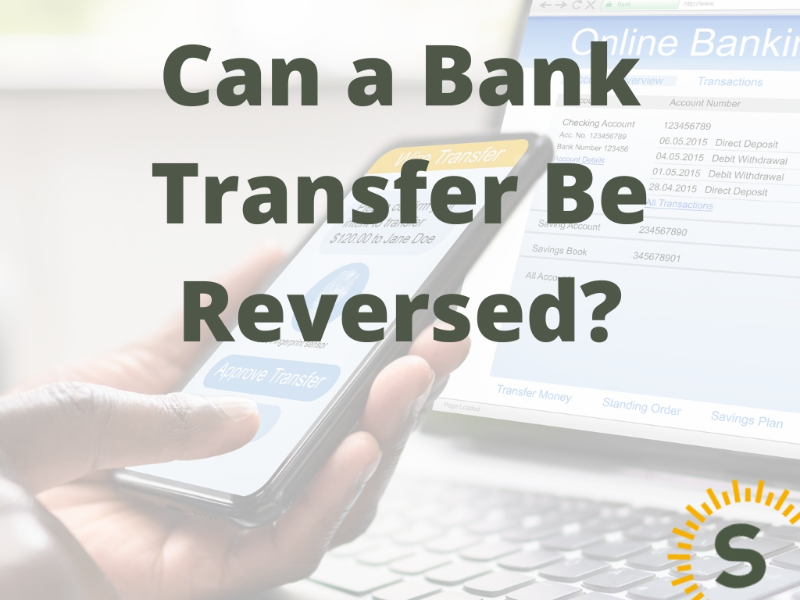
Transferring money from one account to another has become a commonplace activity in our digital age. However, mistakes can occur, leading to funds being sent to the wrong account.
A prevalent question that arises from such an unfortunate circumstance is: can a bank transfer be reversed? This insight will explore that question and provide an in-depth analysis of the process involved in reversing a bank transfer.
Yes, a bank transfer can be reversed but timing is key. Acting swiftly after an error increases the chances of being successfully. Contact your bank as soon as possible because If funds are withdrawn or moved fraudulently, recovering the funds becomes challenging and less likely.
Before we delve into the question, can a bank transfer be reversed, it's crucial to have a firm understanding of what a bank transfer is. A bank transfer, also known as a wire transfer or faster payment, is the process of sending money from one bank account to another electronically.
These transfers can be made within a single institution or across different banks.
Bank transfers are a popular method of payment due to their convenience and speed — especially with the rise of online banking. However, as user-friendly as these transactions are, they're not immune to human error.
It's not uncommon for people to enter incorrect account details when setting up a transfer, leading to money ending up in the wrong place.
If you've mistakenly transferred money to the wrong account, don't panic; there are several steps you can take to rectify the situation.
The most crucial step in this process is to notify your bank as soon as you realise your mistake. The bank should then act within two working days to start the process of reclaiming your money.
They'd do this by contacting the recipient's bank, requesting that the funds be returned.
Once your bank has contacted the recipient's bank, the recipient will be notified of the erroneous transaction. They are given an opportunity to dispute the claim, but they'd need a valid reason to do so. If they refuse to return the money, an investigation will be conducted.
Assuming there's no dispute, the funds should be returned to you within 20 working days. However, if a dispute arises, the bank will notify you of the outcome of their investigation within the same timeframe.
If you're unsatisfied with the outcome, you can escalate the matter to the Financial Ombudsman.
Can a bank transfer be reversed once it has been processed by the receiving bank? While it's challenging, it's not impossible. Here's the procedure you'd need to follow:
However, if the bank can't reverse the transaction, you may need to seek legal redress to recover your money.
If your bank is unable to retrieve the funds — perhaps due to a dispute — they are required to provide clear information on the next steps available to you. These may include lodging a formal complaint or taking legal action against the recipient.
If you're discontented with how your bank handled the situation, you have a right to lodge a formal complaint. The complaint should follow your bank's formal complaints procedure, which can usually be found on their website.
If you're still unhappy with the resolution, you can escalate the issue to the Financial Ombudsman, an independent body that resolves disputes between customers and financial institutions.
To prevent the need for asking "can a bank transfer be reversed?" in the first place, it's crucial to be cautious when making transfers. Here are some steps you can take:
If you find yourself on the other end of a mistaken transfer, it's crucial to report it to your bank immediately. Retaining and spending money sent in error could lead to charges of 'retaining wrongful credit'.
In most cases, once a bank transfer has been made, it can't be cancelled as the funds are usually transferred immediately. However, you should contact your bank as soon as possible if you need to cancel a bank transfer. If the payment hasn't been processed, they may be able to stop it.
Yes, online payments can also be reversed, but it depends on the situation. If you realise the mistake quickly and contact your bank, they might be able to help reverse the payment. However, if the payment has already been processed or if the recipient refuses to return the money, it could become more difficult to reverse the payment.
It's essential to act promptly and communicate with your bank to increase the chances of a successful reversal.
While bank transfers are generally safe, they come with potential risks, such as fraud, lost or stolen money, and delayed transfers. If you fall victim to a bank transfer scam, report it to the police immediately and contact your bank to reverse the payment.
While bank transfers offer a convenient way to send money, it's essential to be careful and double-check all details before confirming a transfer. If you do end up asking can a bank transfer be reversed due to a mistake, contact your bank immediately, and they may be able to help you retrieve your funds.
Yes, a bank transfer can be reversed, but prompt action is crucial. Contacting your bank immediately after realising the mistake increases the likelihood of successful reversal. The process involves notifying your bank, which then contacts the recipient's bank to initiate the return of funds. If there's no dispute, the funds should be returned within 20 working days.
To prevent misdirected payments, individuals should double-check account details, amounts, and payment references before confirming transfers. Using the Confirmation of Payee (CoP) system to verify recipient details can also help ensure accurate transfers.
If someone receives money in error, they should report it to their bank immediately to avoid potential legal repercussions. While bank transfers are usually irreversible once sent, contacting the bank promptly may allow for cancellation if the payment hasn't been processed.
Online bank transfers can be reversed in certain situations, especially if the mistake is recognised quickly and communicated to the bank. However, the process becomes more challenging once the payment is processed or if the recipient refuses to return the funds.

Stuart is an expert in Property, Money, Banking & Finance, having worked in retail and investment banking for 10+ years before founding Sunny Avenue. Stuart has spent his career studying finance. He holds qualifications in financial studies, mortgage advice & practice, banking operations, dealing & financial markets, derivatives, securities & investments.





Our website offers information about financial products such as investing, savings, equity release, mortgages, and insurance. None of the information on Sunny Avenue constitutes personal advice. Sunny Avenue does not offer any of these services directly and we only act as a directory service to connect you to the experts. If you require further information to proceed you will need to request advice, for example from the financial advisers listed. If you decide to invest, read the important investment notes provided first, decide how to proceed on your own basis, and remember that investments can go up and down in value, so you could get back less than you put in.
Think carefully before securing debts against your home. A mortgage is a loan secured on your home, which you could lose if you do not keep up your mortgage payments. Check that any mortgage will meet your needs if you want to move or sell your home or you want your family to inherit it. If you are in any doubt, seek independent advice.